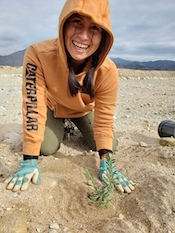|
|
 |
Ryan GarrisonRyan is a Ph.D. candidate studying the
interactions between non-native insect herbivores
and their host plants, and he is particularly
interested in the use of Arboreta, including the
Washington Park Arboretum, in research. Ryan
earned his B.S. degree from Michigan State
University, and he earned his M.S. degree from the
University of Washington studying the invasive
azalea lace bug on Rhododendron spp. in
western Washington. In addition to his graduate
studies, Ryan is also a Plant Health Specialist
with the University of Washington Botanic Gardens.
|
 |
Gissella QuirogaGissella is an M.S. student studying the effect of balsam woolly adelgid in the Pacific Northwest, and the basis of host tree resistance balsam woolly adelgid in the Gifford Pinchot National Forest. Gissella graduated from Cal Poly San Luis Obispo with a B.S. in Forestry & Natural Resources and Environmental Management & Protection in 2021. She has since worked for CalFire’s Jackson Demonstration State Forest and then Inland Empire Resource Conservation District.
|
 |
Marlee Theil
Marlee is an M.S. student using dendrochronology to reconstruct outbreak histories of western blackheaded budworm and hemlock sawfly in the Tongass National Forest of southeast Alaska and the Olympic National Forest of western Washington. Her research aims to provide land managers with empirical data to inform decision-making related to the protection of forest resources and preservation of forest health in the Pacific Northwest. Prior to graduate school, Marlee worked as a project manager for Ash Creek Forest Management, where she developed restoration and reforestation plans across western Oregon. She also worked as a wildlife biologist for the University of Florida, conducting research on both native and invasive species in southern Florida. |
Lab Alumni: Graduate Students
Autumn Maust
(Ph.D., 2025) Quantifying the effects of fire reintroduction on
native pollinators in ponderosa pine forests of the
Pacific Northwest.
Alex Pane (Ph.D., 2023) Bark beetle and
defoliator interactions across Pacific Northwestern
forests.
Lila Westreich (Ph.D. 2021) Native
solitary bee health in western Washington.
Michael Bradshaw (Ph.D., 2020) Epidemiology and biology of powdery mildews and their host plants.
Ryan Garrison (M.S., 2020). Optimizing management guidelines for the non-native azalea lace bug on Rhododendron species in western Washington.
Jacob Betzen (M.S., 2018). Bigleaf maple decline in western Washington.
Sean Callahan (M.S., 2017). Effects of traffic-derived Cu pollution and climate change on arboreal Collembola in Western Washington, USA.
Michael Freeman (M.S., 2017). The role of abiotic and biotic factors in Douglas-fir decline in the western Cascades, Washington.
Riley Metz (M.S., 2017). Effects of temperature and host distribution on gypsy moth growth rates along its expanding population front.
Marisa Bass (M.F.R., 2016). Comprehensive five-year harvest and transportation plan for Hancock Forest Management's Tahoma Client.
Lab Alumni: Undergraduate Students
Katharine Gilliam (Senior Thesis,
2025). Spongy moth outbreak effects on tree
growth suppression in northeastern Wisconsin: A
dendrochronological analysis.
Emily Reeves (Senior Thesis, 2025).
Role of climate in host plant tolerance to white
pine blister rust.
Camille Cubé (Senior Thesis, 2023).
Post-fire Vespidae communities in eastern
Washington.
Mia Taylor (Senior Thesis,
2022). Investigating effects of urbanization
and habitat type on Arthropod and Coleoptera
assemblages in Seattle, Washington.
Diane Shi Wang (Senior Thesis, 2021). Spatial analysis of climate change effects on hemlock woolly adelgid and eastern hemlock.
Adara Schneider (Senior Thesis, 2020). Biology and ecology of invasive insects on conifers.
Morgan Mackenzie (Senior Thesis,
2019). Insect
predators and natural enemies in the Union Bay
Natural Area, and their changes along the
native-nonnative plant community gradient
Marisa De Luccia (Senior Thesis,
2019). Quantifying the effectiveness of chemical treatment on
Lysimachia
Sabrina Gilmour (Senior Thesis,
2019). Effects of increased temperatures
and CO2 on powdery mildew virulence and
plant susceptibility.
Helen Kesting (Senior
Thesis, 2019). Effect of land cover on pollen
provisions of the native solitary bee, Osmia
lignaria.
Kaisja Gifford
Ceci Henderson (Senior Thesis, 2017). The grapes of wrath: Invasion potential of Lobesia botrana (European grapevine moth) in Washington State vineyards under varying climate change scenarios.
Grace Masaoka (Senior Capstone Project, 2017). Investigation of the western sword fern disappearance in Seward Park.
Constance Lin (Senior Capstone Project 2016). Microarthropod species richness and abundance in epiphytic communities along an urban to wildland gradient in Western Washington.
Rachel DeCordoba (Senior Thesis, 2016). Spatial and climate analysis of bigleaf maple decline in Western Washington.
Alex Blumenfeld (Senior Capstone Project 2016). Modelling the drivers of invasion in North American non-native insects.
Kaitlin Stair (Senior Capstone Project, 2015). Consumptive and non-consumptive effects of a generalist predator on larval prey growth.